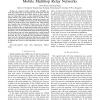122 search results - page 14 / 25 » On the Recognition of Abstract Markov Policies |
CDC
2009
IEEE
14 years 1 months ago
2009
IEEE
Abstract— Q-learning is a technique used to compute an optimal policy for a controlled Markov chain based on observations of the system controlled using a non-optimal policy. It ...
WCNC
2010
IEEE
14 years 13 days ago
2010
IEEE
Abstract—In cognitive mobile multihop relay (CMMR) network, the mobile user as the primary user is allocated with the channel for transmitting data. Relay station as the secondar...
CVPR
1998
IEEE
14 years 10 months ago
1998
IEEE
A new approach to the recognition of temporal behaviors and activities is presented. The fundamental idea, inspired by work in speech recognition, is to divide the inference probl...
ICCV
2005
IEEE
14 years 2 months ago
2005
IEEE
In this paper we develop a system for human behaviour recognition in video sequences. Human behaviour is modelled as a stochastic sequence of actions. Actions are described by a f...
UCS
2007
Springer
14 years 2 months ago
2007
Springer
Abstract. This paper describes daily life activity recognition using wearable acceleration sensors attached to four different parts of the human body. The experimental data set con...


